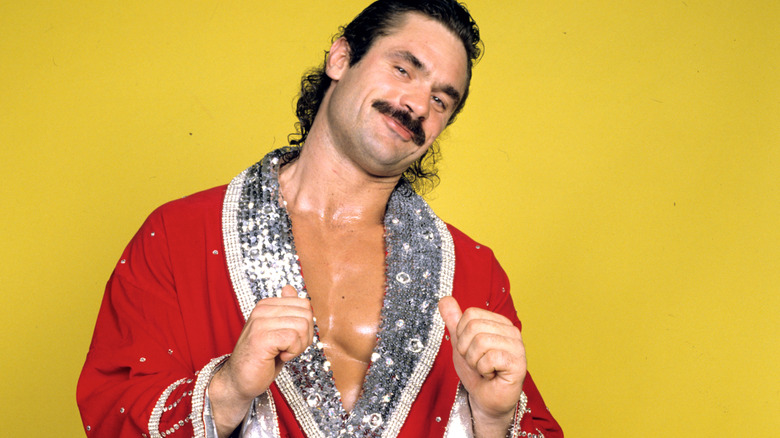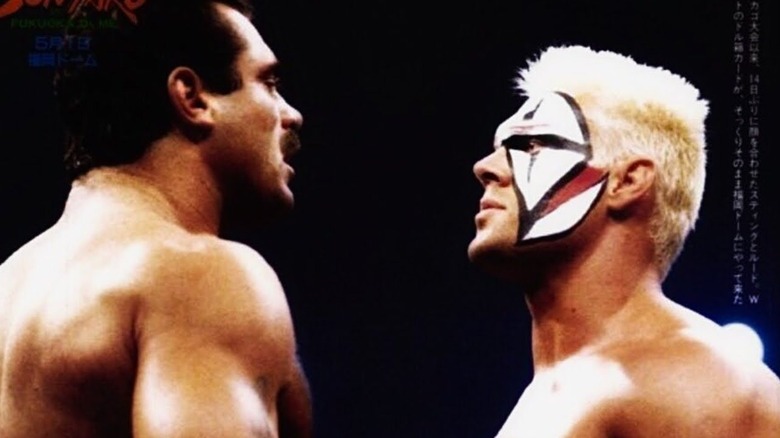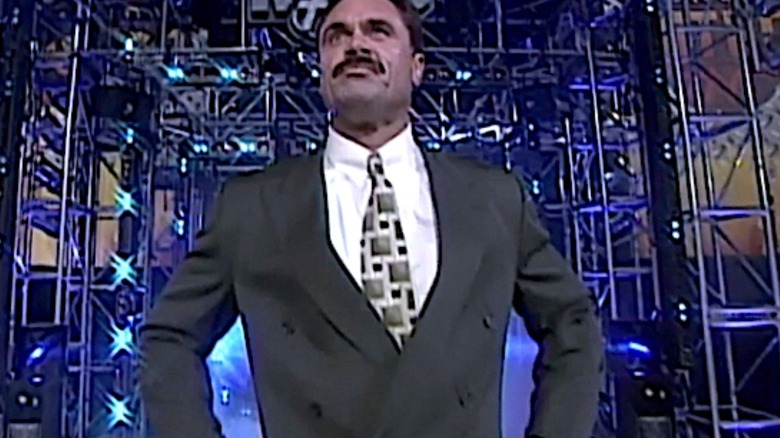Winning A Match Tragically Ruined This WWE Hall Of Famer's Career
May 1, 1994. A total of 53,500 people have jampacked the Fukuoka Dome in Fukuoka Japan for the second-ever Wrestling Dontaku event hosted by New Japan Pro Wrestling. The 1994 edition of Wrestling Dontaku was a special one as it was the only time in the history of the event that it was co-promoted with WCW, who had a working relationship with NJPW during the 1990s. While many of the top names in NJPW at the time had travelled to WCW for one-off appearances since the partnership started, the stars from the United States also made the trip east, and for one of the WCW representatives, they were unaware that they were travelling to what would end up being the final match of their career.
Shortly after The Road Warriors and The Steiner Brothers beat the color out of each other in one of the best matches of the whole night, the short-lived WCW International World Heavyweight Championship would be up for grabs. The title was effectively born out of WCW withdrawing its membership from the NWA in 1993, but still owning the big gold belt that was used to represent their top champion, and because of its association with the "WCW International" brand, the title was defended in both the United States and Japan. At Wrestling Dontaku 1994, it was Sting defending the title against "Ravishing" Rick Rude, and given that Sting ended up having his retirement match at AEW Revolution 2024, you can probably tell who we're going to talk about here.
Outside of a one-off return in ECW in 1997, the match against Sting in Fukuoka would end up being the match that sent Rick Rude into retirement, despite the fact that after a hard-hitting contest, it was Rude who emerged victorious, becoming the new champion in the process.
How Did Rick Rude Get Injured?
Towards the midway point of the match, Rude was on the outside, allowing Sting to hit a big dive to the outside on to Rude which look like it went off without a hitch, but that wasn't the case. In a number of Japanese venues, especially the larger ones, the ringside area is usually placed on a raised platform in order for the fans with floor seats to have a better view of the action. This platform is usually gated off with a steel barricade, with the barricade for the fans a little further back, but for this event, the barricade wasn't positioned at the edge of the platform, and when Sting dove to the outside, Rude caught him but fell backwards and the middle of his back hit the edge of the raised platform.
Rude and Sting would not only continue wrestling, but they would take some very big bumps (Rude in particular) on both the hard ring canvas, and even the entrance ramp. All while this was going on, fans were blissfully unaware that they had just witnessed Rude damage his C4 and C5 vertebrae while catching Sting due to the raised platform. Rude is very slow to get up to the point where you think that his selling is almost too good and that something is actually very wrong with him. Despite the injury, Rude not only carried on, but ended up winning and became the new WCW International World Heavyweight Champion.
It wasn't until after the match was over that the severity of Rude's injury became clear, and it was clear that WCW needed to take the title off of Rude as it was looking likely that he might never wrestle again. In short, WCW had Rude vacate the title to crown a new champion, with the storyline reason being that Rude had used the title belt as a weapon in order to retain it in Fukuoka. However, Sting, who was going to be given the title as a result, wanted to win it the right way, and would beat Big Van Vader at Slamboree in July 1994.
The Heat Between Rick Rude And Sting
With Rude's career effectively over, it was only natural that there would be some growing resentment between Rude and Sting over the match in Japan. The two men would eventually reconcile years later, but one incident in the state of Georgia still gets talked about to this day.
According to Sting's close friend Buff Bagwell, Rude confronted Sting on the side of a highway and threatened him with a gun. This all sounds a bit extreme on paper, but the implied threat of violence ended up being over money. Rude was looking to get a hefty payday thanks to his Lloyds of London insurance policy, something a number of wrestlers used to receive financial compensation when finding out that they were no longer able to wrestle. However, in order for the pay-out to go ahead, Sting needed to make a statement in court that backed up Rude's side of the story, who was trying to sue WCW at the time, blaming them for his back injury despite no records of the lawsuit ever existing.
It's relatively unknown as to what Sting said in court, and "The Icon" was reportedly very nervous as telling the truth would have jeopardized Rude's pay-out. However, Rude got his money, and retired with a cool sum of somewhere between $350,000 and $450,000. Eventually, Lloyds of London grew tired of wrestlers taking advantage of their insurance policy and stopped representing them, leading to Rude working for ECW, WWE, and eventually returning to WCW as an on-screen character, the latter of which being the place where he apparently reconciled with Sting. Rude was reportedly eyeing up a return to the ring by the end of the decade, but tragically passed away on April 20, 1999 following a mixed medication overdose.


